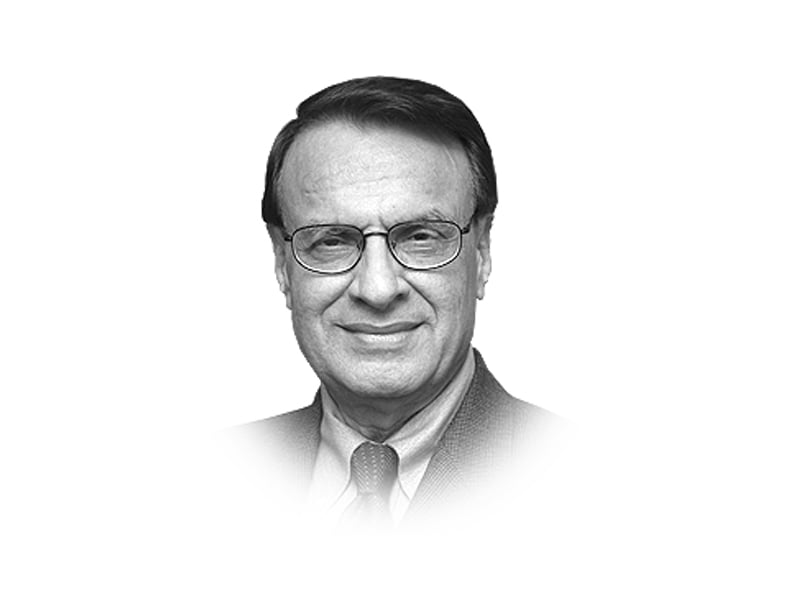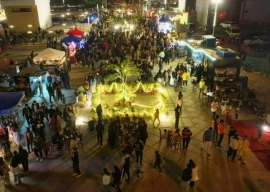

If anything, this episode made one thing clear. The future of Saarc as a regional cooperation organisation remains hostage to the troubled India-Pakistan relationship. Both share the responsibility for providing the needed ‘enabling environment’ of peace and stability free of mistrust and hostility without which no regional cooperative endeavour anywhere in the world has worked. With India-Pakistan peace as elusive as ever, there is no prospect of an early breakthrough towards any meaningful regional cooperation, much less the ambitious plans for economic integration in this vast region.
It is nearly three decades since Saarc came into being as an expression of South Asia’s collective resolve to develop a regional cooperative framework for the socio-economic well-being of the peoples of its member-states. This promise remains unfulfilled. Saarc has neither improved the quality of life in the region, nor accelerated economic growth, social progress and cultural development of its member-states. In fact, economic growth indices, with rare exceptions, are static, if not going downwards. No wonder, South Asia remains one of poorest regions in the world with the vast majority of its people still living in grinding poverty and sub-human conditions.
Five of the eight Saarc member states — Afghanistan, Bangladesh, Bhutan, the Maldives and Nepal — belong to the UN’s category of Least Developed Countries or LDCs. With its unbroken legacy of poverty, hunger, disease, illiteracy and conflict, Saarc, as a regional cooperation organisation, has not gone beyond declaratory pronouncements with no tangible achievement to its credit. We just had yet another high-sounding but low-yield 36-point declaration adopted at the Kathmandu summit, which was no more than a rehash of the same old familiar summitry reaffirmations and reiterations that never had any practical value for the peoples of this region.
There is something fundamentally wrong that keeps this region from developing a genuine regional impulse. We have been hearing the same rhetoric at every Saarc summit from our leaders “reaffirming” their commitment to the principles and objectives outlined in the Saarc Charter. These pronouncements are a reflection of the only ‘consensus’ that we seem to have developed at the regional level, acknowledging the grim reality that Saarc, during the last three decades of its existence has just not lived up to its promise and potential. Prime Minister Modi, in his debut speech at the Kathmandu summit, could not have been more candid in depicting the region’s dilemma.
“When we speak of Saarc, we usually hear two reactions — cynicism and scepticism. This, sadly, is in a region throbbing with the optimism of our youth. Let us work to change cynicism into optimism,” he said, adding “as Saarc, we have failed to move with the speed that our people expect and want. Nowhere in the world are collective efforts more urgent than in South Asia; and, nowhere else is it so modest.” What he rightly meant was that South Asia is out-of-step with other regions of the world, which have been able to transcend their differences and disputes, moving on a steady course to economic growth and regional integration.
Speaking from a prepared text in English, Prime Minister Modi suddenly broke into Hindi: “Hum paas paas hain par saath saath nahin. Saath saath honey se taqat kai guna barh jaati hai” (We are neighbours but we are not together. By staying together, our strength can increase manifold).” He admitted: “India, too, has its share of responsibility because of its size and location. I know India has to lead, and we will do our part. I hope each of you will, too.” He then reiterated what his predecessor Manmohan Singh, too, had suggested — the need for improved connectivity in the region. Surely, ‘connectivity’ — physical, economic and of the mind will enable the region to come together and fully tap its potential.
If Prime Minister Modi is a man of vision, he would know what really is wrong with Saarc. It is not just poverty and backwardness in the region. It is South Asia’s geopolitical peculiarity in which all Saarc countries share a border with the largest state of the region, India, but not with one another. This unique geographic feature limits the scope of cooperation to a great degree. It makes transit trade difficult, since there remains no room for bypassing Indian borders, granting India a virtual control over all proposals for intra-regional cooperation.
India, because of its sheer size and centrality, stands more or less alone as an exclusive ‘power’ without having to be identified in tandem with the rest of the countries in the region, some of which, like Bangladesh and Pakistan in terms of population, are not that small in the global rankings. India’s geographical centrality also gives rise to a host of border conflicts and water disputes in the region all of which involve India. In essence, it is these bilateral disputes that have kept Saarc from delivering on its promise and potential.
While other regional organisations around the world, including the European Union and Asean, have moved ahead in political harmony, Saarc remains fraught with centrifugal tendencies and mutual mistrust from the very beginning. Absence of an intra-regional dispute settlement mechanism has severely limited its capacity to contribute to regional peace, security and development without which there can be no meaningful progress in socio-economic and cultural cooperation in the region.
For an enabling environment, South Asia must free itself of tensions, conflicts and escalating military budgets for which the onus rests solely with India. Durable peace is sine qua non for South Asia’s stalemated process of regional cooperation. Also, the ‘connectivity’ that India now seeks through Pakistan into Central Asia and Europe depends on its ability to settle its disputes with Pakistan, including the Kashmir issue.
It is time South Asia, so rich in history, culture, and material and human resources, rediscovered its lost strength and indivisible identity to build dividends of peace and prosperity rooted in common interests to be able to play a balancing role on regional and global levels. But are we sure about India?
Published in The Express Tribune, December 6th, 2014.
Like Opinion & Editorial on Facebook, follow @ETOpEd on Twitter to receive all updates on all our daily pieces.
COMMENTS (15)
Comments are moderated and generally will be posted if they are on-topic and not abusive.
For more information, please see our Comments FAQ

1720097164-0/BeFunky-collage-(9)1720097164-0-165x106.webp)


1734567485-0/Untitled-design-(54)1734567485-0-165x106.webp)








@waqas arif: No one in the world calls it indo-pak subcontinent. It is referred to as Indian subcontinent. Tomorrow you will call Indian Ocean as Indo-Pak Ocean!
Dear Shamshad Bhai. thanks for the article, the flavour is the same, I was in goverment for 37 years, did not do much. when democratic elections are going on some state supported mscreants kill 15 defence staff. They carry chicken achari packets used by army regulars. So close yet so far. i m unable to do anything. I looked my best with Achkan and shalwar kameez with Zia ul haq and team to washington met Ronald Reagan in 1982.
indeed,it is ironic that saarc is the least productive regional organization around the globe.one will have to analyze the role of all its members.if indians argue the pakistan is apple of discord in the development of region they may try their luck with "minus pakistan saarc".both india and pakistan are equally to blame for the failure of saarc failure,since both of them are security states. @avmpolpot:dear pakistan is gateway to indo-pak subcontinent.you cant deny this fact.mr racist.
As greater minds than mine have stated ++++++++++++++++++++++++++++ Pakistan is an arabic state...what is it doing in Saarc? Are UAE, Saudi,Kuwait a member of Saarc ?
No organization, including Saarc, can work together if there is a fundamental clash of values, philosophies and vision amongst its members. Pakistan by its own admission is clear about the following: - national philosophy - it is a an Islamic nation in which Muslims come first (see its constitution). Minorities are ignored and reduced to survival. Hatred towards India is taught in all its schools. The Pakistani mindset is hard wired to hate and harm India. - Geographically and culturally it sees itself as part of the Middle East - not South Asia. - national purpose: all means and conduct are justified, including export of violent "strategic assets", to impose its will on India and Afghanistan. Its national interest is all centered around control of Kashmir and Kabul.
India and other Saarc nations do not share the above. For Pakistan Saarc serves its national interest. It is another body where it gets to bring up Kashmir. And that is progress for Pakistan. Saarc may not move ahead but India and others should.
An air of trust and a greater security confidence account for positive results in an organisation bearing the slogan of regional cooperation.Issues faced by South Asian nations encapsulating economical crisis to extremist elements are by no means closer to those of Europeans or Eastern countries.Here resides the oldest conflict of Kashmir;this region has experienced the greatest War on Terrorism in Afghanistan; and has encountered the threat of nuclear war between India and Pakistan.Definitely these matters frustrate the atmosphere in South Asia.In the emerging scenarios of new American policy of re-balancing of power in Asia-Pacific region ,need of promoting unity and solidarity is all the more evasive.Apart from building CBMs between India and Pakistan, and Pakistan and Afghanistan,material solutions to the real problems should be sorted out.
Out of eight there was one country that blocked the SAARC Connectivity by road, rail etc. That country only get Energy pact go through. That is the nuclear power Islamic Republic of Pakistan. Why we are so small hearted that we cant let a road go through and our claim is to become leaders of Islamic world & role model for humanity at large. Such a pity.
Arguably, it is India's responsibility to bear the larger burden to make SAARC a success. India should also take the lead in resolution of disputes with a generous attitude. But that is next to impossible when a member state doesn't recognize the benefits of association and uses terrorism as a policy to achieve goals it could not in conventional war. Pakistan direly lacks institutional structures to enable it to function as a normal state.
The former Foreign Secretary surely knows SAARC is an odd grouping - a collection of states, and as the author states, the majority of which are LDCs. There is little to compare with the EU or even ASEAN, where the distribution of wealth and power is more even. There are some who have argued that SAARC needs to be folded up; there has not been a single group initiative that has seen fruition. India's economy is almost six times larger than all the others combined, its trade in goods and services (now nearing $1 trillion), is again many times more than the total of the others. What kind of cooperation do you expect in these circumstances? Besides, the strategic objectives of the various states in SAARC are often different, if not actually hostile, such as between India and Pakistan. The only benefit of SAARC is that it has spawned a number of organizations that deal from literature and the arts to doctors and so on that have facilitated people to people contacts.
The ball has started rolling ... India and Bangladesh have started moving towards greater economic integration ... Nepal is next in line ... Modi's leadership is poised to change the face of a good part of the SAARC in the years ahead ...
India has learned to get its economy growing despite its relations with Pakistan ... India's economic growth will never remain hostage to either Pakistani trade route or the Kashmir conflict ... just watch India for another ten years ... !!
Why SAARC will remain hostage to India Pak bilateral issues ? what Bangladesh or Nepal has to do with Kashmir ?
If Pakistan is not interested in regional co-operation or looks at it through the prism of bilateral issues why does not it leave SAARC and spare all other members ?
It is somehow ironic Pakistan is ot on the list of least developed countries but Bangladesh is!
"There is something fundamentally wrong that keeps this region from developing a genuine regional impulse." There's a specific term for it: "Pakistan"
"It is time South Asia, so rich in history, culture, and material and human resources, rediscovered its lost strength and indivisible identity to build dividends of peace and prosperity rooted in common interests to be able to play a balancing role on regional and global levels."
Remove Pakistan out of SAARC and the group countries will experience progressive growth and development. You are trying to imply it is India which has "bilateral disputes" with everyone and that is hampering development of SAARC countries. But facts say, India proposed 3 agreements for development of SAARC countries which ALL the countries agreed upon (that is, sided with India). Only 1 country rejected all agreements, and this same country has always done the same thing thus effectively stopping SAARC's regional integration and growth for decades. That country is none other than Pakistan. Please leave.
we are so close , but Pakistan can't collect dead bodies of Pakistani terrorists from India . We have no way to dispose other than burning them for bonfire in winter .
?But are we sure about India?" +++++++++++++++++++++++++ Well, at least we r sure about Pakistan...the global epicenter of Terror, a failed state with a failed polity, a global headache.